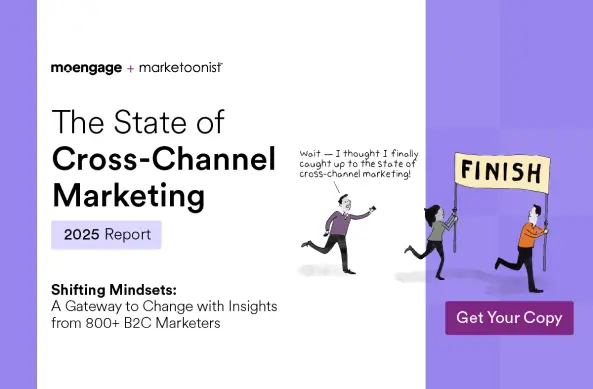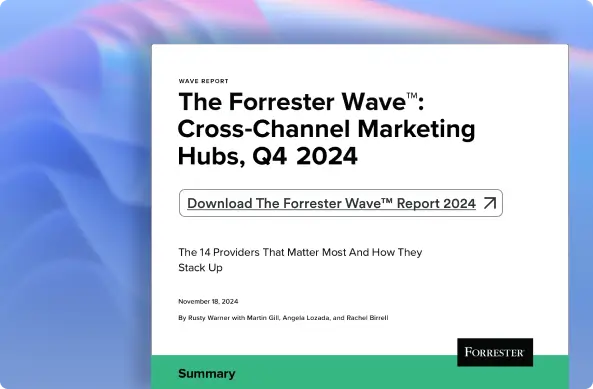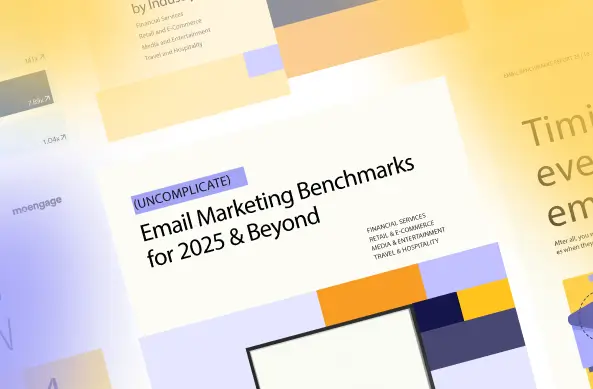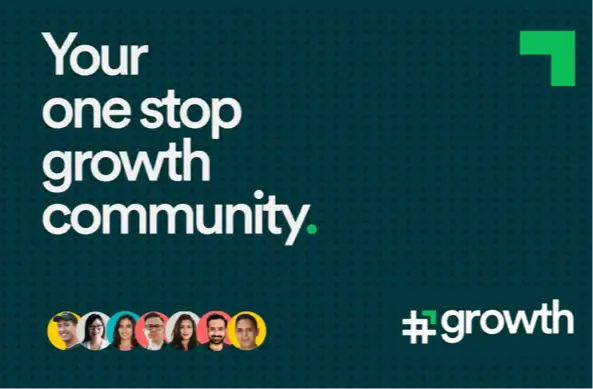COVID-19 Business Impact, Brands’ Responses, Marketing Strategies, and More

Reading Time: 17 minutes
Note: This is a regularly updated assessment of the business impact of the novel Coronavirus [COVID-19] on consumer brands and the steps they’ve taken to deal with the fallout. Click here to directly jump to the latest updates.
We’ll cover recent stories, marketing strategies, and news from around the world as the situation continues to evolve – go ahead and bookmark this page for the latest updates, trends, and news.
As a part of the COVID-19 series, we have released a report, “Coronavirus Business Impact: Data-driven insights for brands during COVID-19”, in collaboration with Apptopia, the most trusted partner for App Store data.
In this report, we analyze over 1.50 billion mobile app users from 12 different industries in North America, Europe, Middle East, India, and Southeast Asia. You can download the detailed report here.
COVID-19: Introduction
COVID-19 has set upon us like an ancient plague. As you’re reading this, the global economy’s trendline is dipping with uncertainty. If this trend continues, it will cost the global economy $2.7 trillion.
But, that’s the kind of information we’ve all been reading over the past few weeks. While it’s important to be attuned to this data, you must also be up-to-date with lesser-known, yet important trends and brand stories from around the world.
As an organization, we’re at the intersection of brands & consumer engagement capabilities. This vantage point allows us a view of the impact of this pandemic on consumer brands. We’ve seen how companies have gone beyond a ‘business-as-usual’ approach to help end-users stay informed and safe – that’s the story we’ll share through these updates.
Data stories from around the world
[last updated: May 5th, 2020, 1005:00 AM UTC]
The negative impact is severe not only in China, the epicenter of the outbreak, but also around the world. The U.S. has undergone a serious disruption in domestic and economic operations due to the extensive spread of the virus through physical contact.
While health organizations and governments are striving to curb the rate of infection caused by the virus, its impact on consumer businesses goes much deeper.
Here is a list of industries and geographies impacted by COVID-19:
1. Travel & Hospitality: Downward spiral as consumer confidence takes a dip
2. Video Conferencing Apps: It’s zoomin’ big time!
3. Online Shopping: e-commerce and wholesale mobile apps rise on the wave of panic shopping
4. Online food delivery apps: work and order from home
5. Marketing in the times of COVID-19
6. Businesses respond to COVID-19
1
Travel & Hospitality: Downward spiral as consumer confidence takes a dip
- The trend for the combined downloads of the world’s top 45 OTA apps shared by Apptopia indicates a swift decline starting as early as late January when the first cases of COVID-19 created panic among travelers.
- This trend further amplified in late February and early March with different countries imposing travel restrictions.

The hospitality industry is fighting a similar downward trend. Here’s the global data for new users checking into the world’s top 5 hotel chains.
The nosedive in the hospitality industry starts around the first week of March, reaching an all-time low in the past 3 months.

Customer Stories: Treebo’s emails and safety precautions
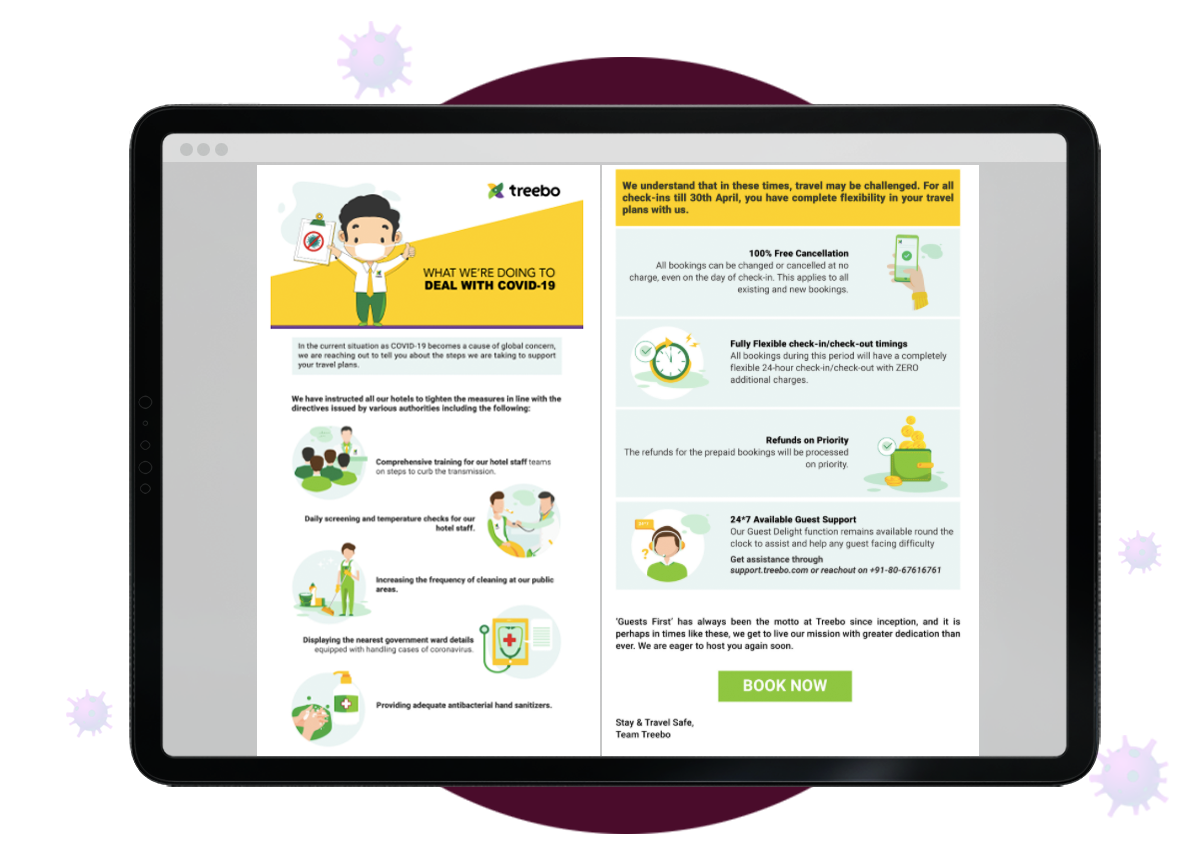
The hospitality industry may be among the hardest hit by the pandemic. Players in this industry have been doing everything in their control to ensure that their users are safe. Treebo, the best-rated hotel chain in the budget segment in India and also our customer, is actively taking steps to reassure its clients in the COVID-19 world.
The brand has been using MoEngage’s AI-powered customer engagement platform to run ‘Preparedness against COVID-19′ email campaigns. The emails include a detailed infographic on various safety measures being implemented by the brand. Apart from comprehensive cleaning and regular staff checks, the brand is also offering free cancellation and faster refunds during these tough times. Treebo is leaving no stone unturned in reiterating their motto, ‘Guests First’, in every way possible. This campaign is now a week old and Treebo has reached 1 lakh users each day.
Airbnb to halt all marketing spends and hiring amid COVID-19
Airbnb, one of the world’s largest online marketplace for people looking for accommodations is hit severely by COVID-19. If multiple reports at The Independent and Reuters are to be believed the hospitality giant is not only looking to shut its marketing spends which will save it 800 Mn dollars but also thinking of freezing all its hiring.
The reports further suggest that CEO Brian Chesky didn’t deny or approve rumors of any immediate layoffs. When confronted he said ‘nothing’s off the table’. The top leadership has also agreed to not take any salary to a 50% drop in salary to accommodate the slump the entire industry is going through.
This comes in the aftermath of Airbnb announcing on March 27 that they will provide free housing to healthcare providers and frontrunners in the fight against COVID-19 with safe, clean spaces. Reportedly more than 12,000 homestays worldwide agreed to do this.
We are partnering with our hosts to provide healthcare providers, relief workers, and first responders on the front lines of the COVID-19 pandemic with places that are safe, clean, and allow them to be close to their patients. https://t.co/7ZVfNmvgQI
— Airbnb (@Airbnb) March 26, 2020
2
Video Conferencing Apps: It’s zoomin’ big time!

With companies and communities enforcing work from home policies, the upward spiral in video conferencing apps was to be expected. However, what came as a surprise was Zoom’s meteoric rise as compared to other platforms. These Zoom tips and tricks have helped teams and companies integrate and use the platform in a more simple way.
- Early rising trends in the industry can be spotted around the first week of March.
- Zoom, the leader in this cohort, grew its new user base by almost 300% since March 8th, when work from home and social distancing policies came into effect.
- Second, by a huge margin, Microsoft Teams is closely followed by Google Hangouts Meet.
- We estimate this rise to continue both in terms of downloads and sessions in the weeks to come
3
Online Shopping: e-commerce and wholesale mobile apps rise on the wave of panic shopping
With major cities announcing lock-downs, self-isolation and social distancing have led to an increase in user activity on online shopping apps in the United States. E-commerce and online retail mobile apps have seen a steady increase in new and active users since the first week of March 2020.
Increase in user activity on e-commerce apps in the United States

Online wholesale mobile apps show a similar trend – a sharp increase in new users, active users, and spends in the second week of March 2020. We predict that the number of active users will remain higher than that in January and February of 2020.
Increase in new users downloading wholesale mobile apps in the United States

The United States isn’t the only region showing a steady increase in online shopping. Here is an interesting trend from India – more users have started spending on e-commerce and online grocery apps since January 2020. In fact, there is almost a 50% jump.
Increase in the spending on e-commerce and online grocery apps in India
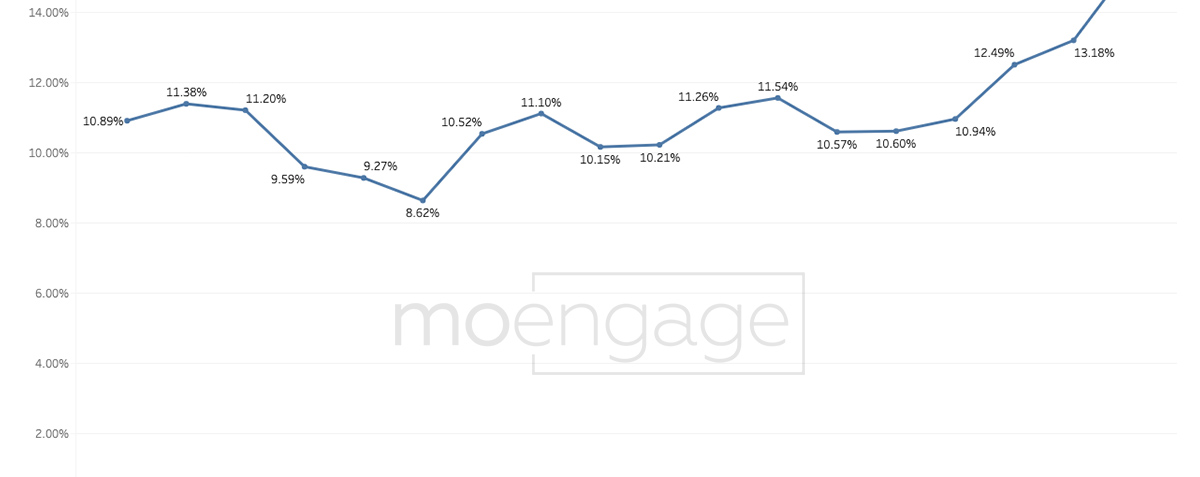
On the other hand, online shopping apps in Southeast Asia have seen a gradual decline in conversion rates since January 2020. This was the time when Malaysia, Singapore, South Korea, Thailand, and Hong Kong reported their first cases and the numbers surged within days.
A gradual decline in conversion rates in e-commerce apps in Southeast Asia
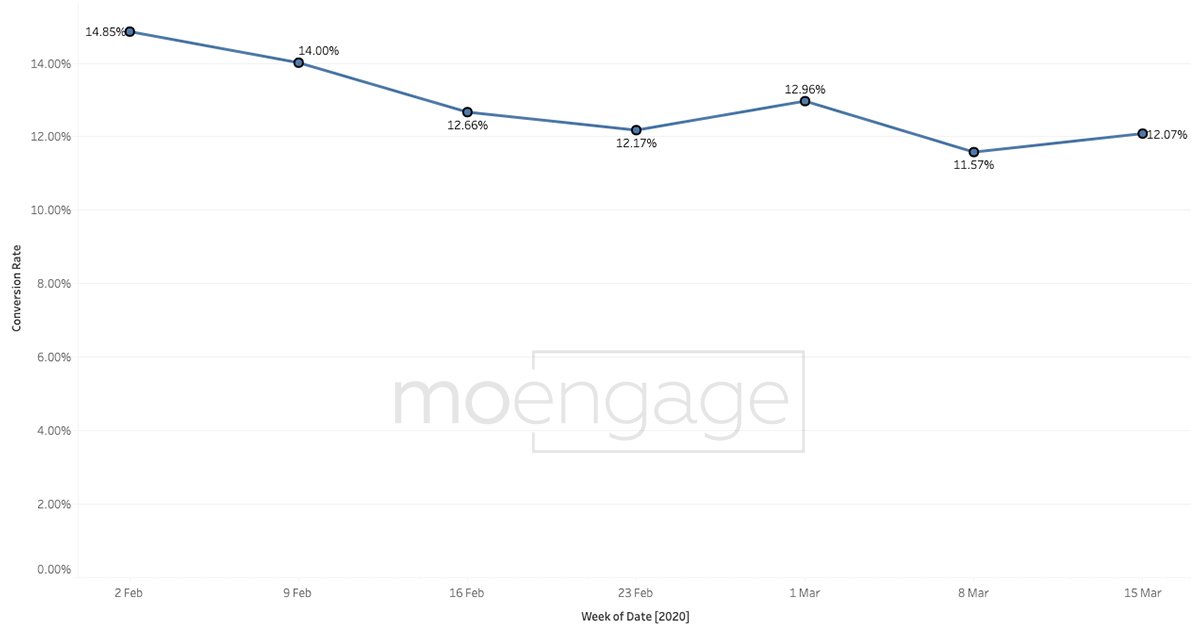
We believe it will take a few more weeks for the conversion numbers to stabilize in Southeast Asia since consumers are still understandably hesitant to purchase online.
Top e-commerce brands in Southeast Asia are adapting to this shift in consumer behavior during the COVID-19 outbreak quickly and diligently.
Customer Stories: Blibli’s awareness campaigns and safety protocols
Blibli, a unicorn in the e-commerce industry from Indonesia, has been offering an easy yet excellent online shopping experience to its users for almost a decade now.
In light of COVID-19, Blibli is reaching out to more than 1M users daily with their awareness campaign, called #KarenaSehatNo1 (#HealthIsNo1), via emails and app push notifications.
Through this campaign, the e-commerce giant is encouraging its users to stay at home and utilize the platform, along with Blibli Express Service logistics, to order their daily needs and stock up on crucial items.
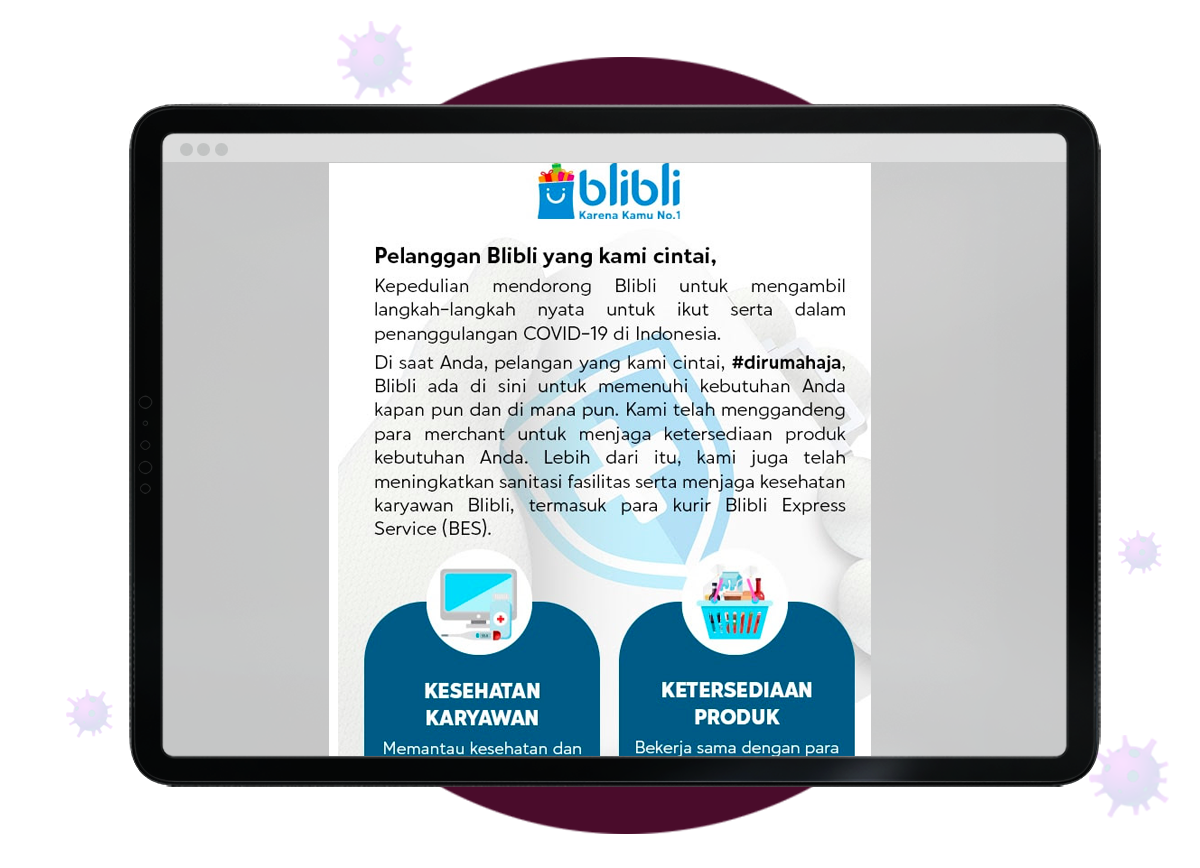
Blibli has also taken steps to ensure that all its users can buy the necessary products online.
- They have worked with merchants to ensure the availability of products such as soaps, sanitizers, anti-bacterial wipes and vitamins that will help users build up their defenses against the pandemic.
- Moreover, to curb stockpiling, Blibli has imposed limits on the number of units of a product that each user can purchase.
On the operations side, Blibli has established stringent sanitization procedures at their facilities – from offices to warehouses.
- Packages entering and exiting warehouses are sanitized, while the logistics crew are equipped with hand sanitizers, gloves, and masks for their safety.
- Blibli has also implemented Contactless Shipping whereby the logistics crew minimizes direct contact with customers during delivery, including signing delivery forms on behalf of the customers, with their prior permission.
4
Online food delivery apps: work and order from home
Another industry that has seen an increase in user activity is online food delivery apps. Unsurprisingly, there has been a steady increase in user activity on these mobile apps in North America since January 2020.
A steady increase in the number of active users on food delivery apps in North America

Apps in the region are taking steps to support their users at this time. For example, DoorDash an on-demand prepared food delivery service app in the region has waived off the delivery fee for local
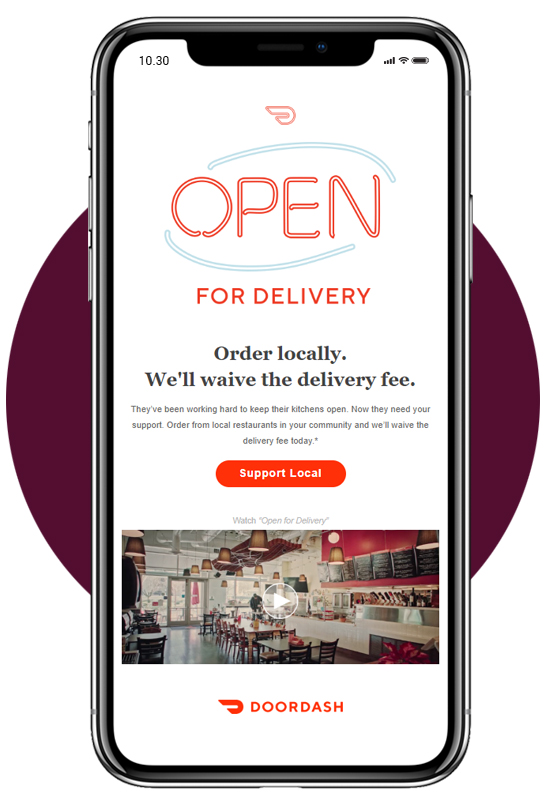
In Southeast Asia (Thailand, Malaysia, Philippines, Taiwan, Hong Kong, and Singapore), online food delivery apps have seen a similar increase in new users and active users.
A steady increase in the number of active users on food delivery apps in Southeast Asia

Food delivery apps in India, on the other hand, are struggling to get new users and keep their existing customers active. There is a steady decline from December 2019 to March 2020.
A gradual decline in the number of active users on food delivery apps in India

We believe this decline will continue in the coming months, especially since India enters a 21-day lockdown.
5
Marketing in the times of COVID-19
Here’s how some more leading brands have gone beyond business value and let app users know that the brand cares for them.
OYO Hotels and Homes is one of the world’s leading chain of hotels and homes. During these times, OYO has unveiled a diverse and layered approach to support those impacted by COVID-19. The brand has modified its communication strategy into a more socially empathizing one, keeping in mind the sensitivities of the situation worldwide. They have also started engaging with their audience via games and daily newsletters.
The OYO daily newsletter acts as a means to reach out to their customers with regular news updates on COVID-19. This newsletter is all about sharing heartwarming stories from the community and highlighting safety tips and hygienic practices.
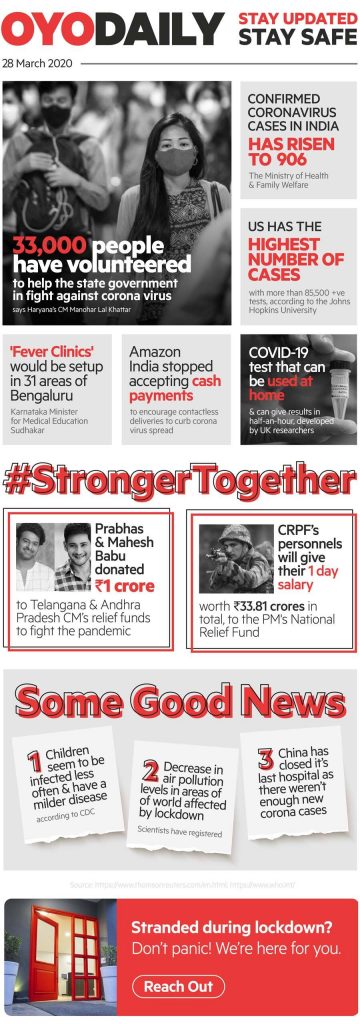
OYO has also revamped its Gaming Zone to focus on a particular segment of their community – for those trying to break the monotony of quarantine.

Apart from this, the brand also modified its OYO Quiz questions around COVID-19 to generate awareness. Whether it is connecting via push notifications at a steady pace, or launching campaigns to help those in need during tough times, OYO continues to extend its solidarity with the customers.
Yatra
Travel and Airline industries are working tirelessly around the clock to ensure the safety of their customers, as well as employees.
One of MoEngage’s customers in this industry is Yatra, India’s leading online travel company. Yatra is providing information on pricing, availability, and booking facilities for domestic and international travel and hotel and homestay bookings. In the midst of the COVID-19 pandemic, Yatra has been vigilant in distributing the right information to travelers. They ran two different campaigns:
- The first campaign was aimed to control panic by offering solutions on how to travel safely and managing upcoming travel plans.
- The second one was to inform all the users about the new rescheduling and cancellation policies issued by the government as well as airlines.
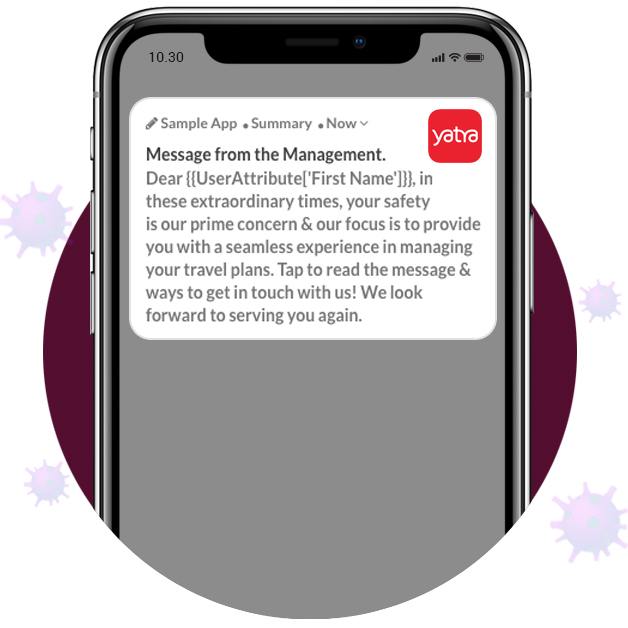
With these campaigns, Yatra reached out to more than 1.5 million users and was able to assist them in rescheduling or canceling booking without any hassle.
Customer Stories: Self-driven cars brand Zoomcar says ‘We Care’
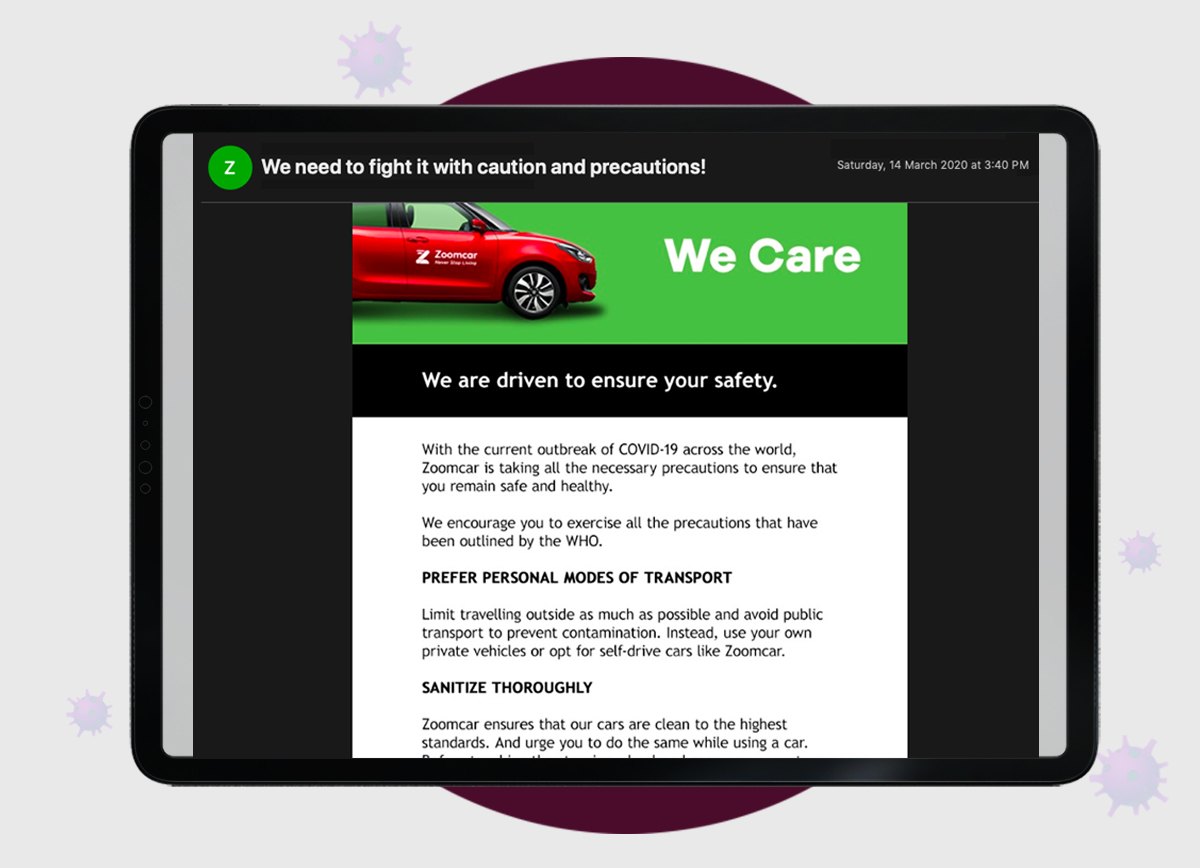
Zoomcar, a self-drive car rental company, provides easy access to users to drive any car across India at premium rates. Their app offers the ease of renting a car with a single click and getting it delivered at the door-step. The brand serves more than 4 million users and is one of the highest-rated car rental apps in India.
Within a week of the Coronavirus pandemic taking hold of India, the brand decided to use MoEngage to run email and push notification campaigns called ‘We Care’ to reassure users about the greater safety offered by self-driven cars vis-a-vis cabs. Zoomcar also disclosed all the safety measures taken to ensure the hygiene of rental cars and the health of delivery executives. The brand is leaving no stone unturned to offer exceptional user experience and maintaining trust.
Customer Stories: No gym, no movies? No worries – Airtel Xstream is here
Closure of gyms, movie theatres and outdoor entertainment venues followed by a proposed nation-wide lockdown has led to an enormous spike in the consumption of entertainment at home via OTT platforms. But are OTTs just a hub for watching movies & TV shows?

Airtel Xstream, a premium online destination for Indians to watch movies, TV shows & LIVE channels, begs to differ. Amidst the COVID-19 chaos, the brand initiated an awareness video campaign ‘#GetCuriousIndia’ aided by one of their content partners, Curiosity Stream.
Throughout the campaign, using push notifications and strategic in-app placements, Airtel Xstream helped viewers learn more about the journey of COVID-19 across the world and how it spread. The brand promoted documentaries, LIVE news & stats amongst their viewers to spread awareness.
Forest Cabin shuts offline stores, uses live streaming for customer engagement
Shanghai-based cosmetics brand Forest Cabin had to shut down 337 physical stores due to the COVID-19 outbreak. But, that did not stop the brand from engaging with their customers. Forest Cabin took to live streaming to stay connected with their consumers. They trained close to 1,600 store attendants to live stream using Taobao, a Chinese online shopping website. As a result, Forest Cabin started adding 3,000 loyalty members every day, up from the typical average of 800 to 1,000. This smart move has helped the brand up its online sales from a modest 25% to 90%.
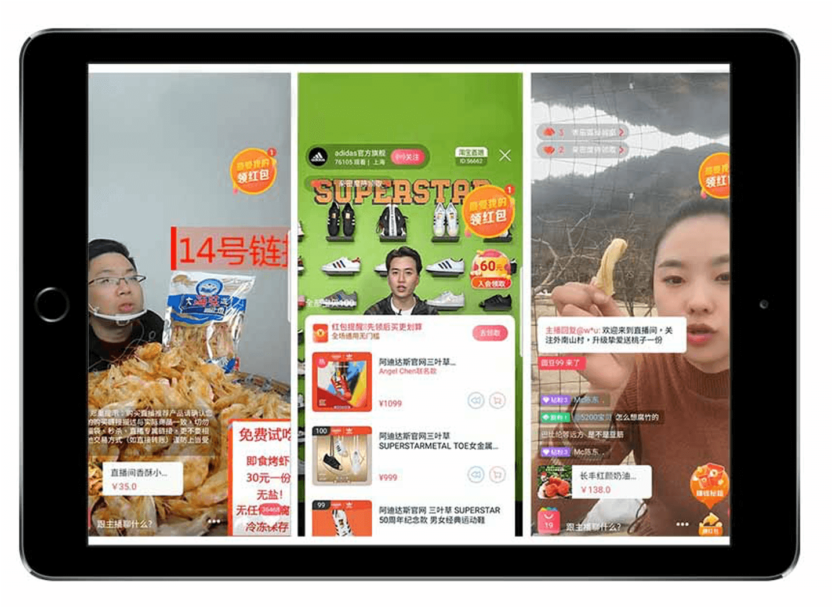
“Stay safe and go online”, says Airtel
Airtel, one of India’s leading telecommunication service providers, caters to 144.76 million subscribers daily. They have a strong offline user base that walks into 500 company-owned and 1,500 franchise stores across India for payment and support. To encourage online adoption, the brand sent SMSes urging users to stay indoors and use their self-care app for bill payments, package activation, support, and more.
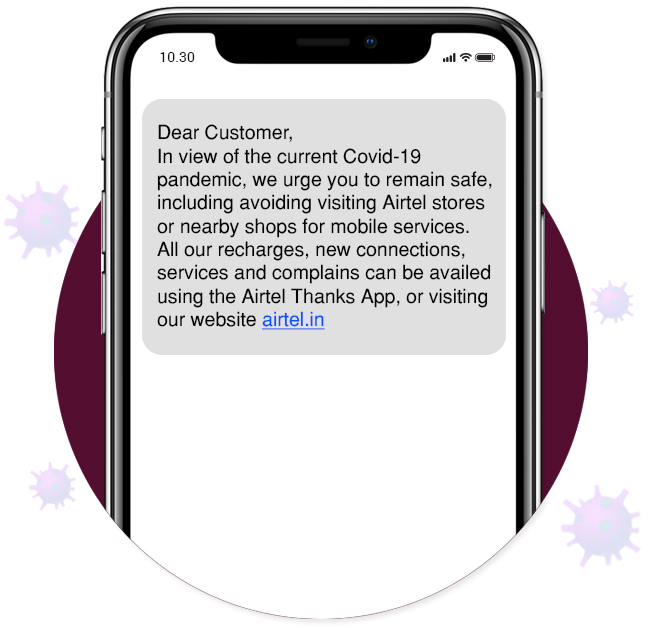
TATA Health uses its 24×7 helpline to give assistance to anyone who wants to talk to doctors
TATA Health, one of the leading healthcare brands that offers primary healthcare solutions in Bangalore including Online & Clinic consultation, medicines & diagnostics at home, has been extremely vigilant during these tough times. The brand has set-up a 24*7 helpline – InstaDoc with doctors available online to give assistance on COVID-19 along with providing consultation on general issues without a consumer being required to go to a clinic. InstaDoc is leading the charge in educating and informing the users on understanding the symptoms of COVID-19, the measures that should be taken to protect oneself & curb the spread, benefits of social distancing, etc. With these campaigns, the brand is reaching out to over 1 million users in Bangalore to reduce the panic around the whole pandemic

Chatbots in healthcare apps assist users in gathering information about COVID-19
Alodokter, an Indonesia-based healthcare super app, provides high-quality online healthcare services to more than 24 million users across Indonesia.
This app has been offering services like booking a doctor, having a consultation via live chat, and purchasing medical insurance. During the COVID-19 pandemic, Alodokter is consistently hosting doctor-approved safety articles on the app for its users. These articles have information on Coronavirus affected areas, measures to control the spread, and quarantine tips. Users receive these articles on their mobile devices via push notifications twice every day, to ensure optimum viewing and reading.

To curb anxiety, Alodokter has deployed real-time chatbots that help users with COVID-19 related queries and safety measures. The responses of the chatbots have been reviewed and approved by a panel of doctors. This chatbot has already interacted with more than a million users in less than a week!
Recently, this campaign gained approval and support from the Indonesian Health Ministry as well. Both of these campaigns have also observed some of the best click-rates and conversion rates Alodokter has witnessed.
Keeping riders safe during the COVID-19 pandemic
Brands that offer public commuting solutions like renting services for cars, two-wheelers, and electronic vehicles are ensuring the safety of their users by keeping their vehicles and spaces clean and hygienic. One such example is Yulu, an Indian brand that offers shared micro-mobility services across urban India.
Yulu has been in the news for its environment-safe vehicles like electric scooters that reduce air pollution. During this pandemic, Yulu is running an awareness campaign by reaching out to more than 1 million users in India informing them about the safety measures taken by their team.
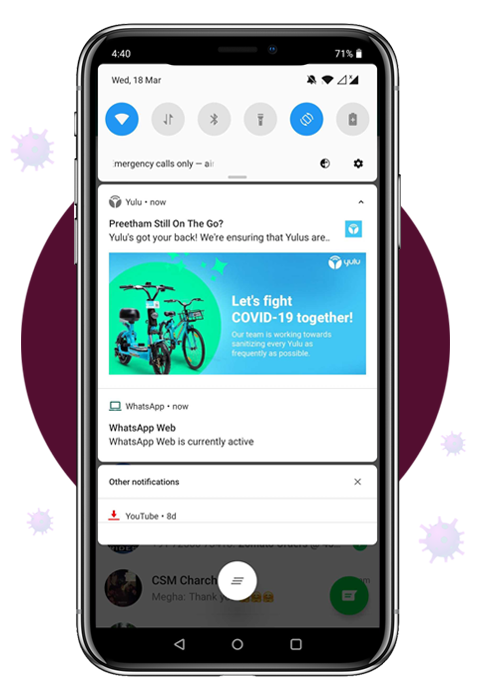
They use push notifications to highlight how the Yulu team cleans and maintains safety protocols for their vehicles. Apart from vehicles, the team is also regularly cleaning all Yulu Zones – spaces where these vehicles are stored for easy access.
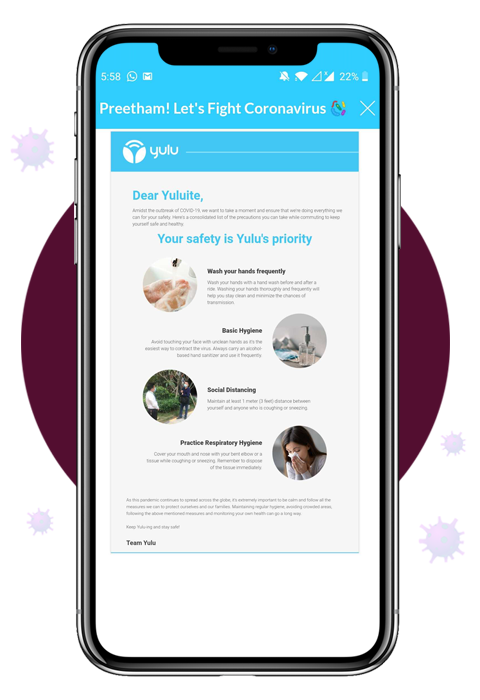
BlaBla
BlaBla Connect, an international calling app, is sending safety messages to its user base of more than 1 million users.
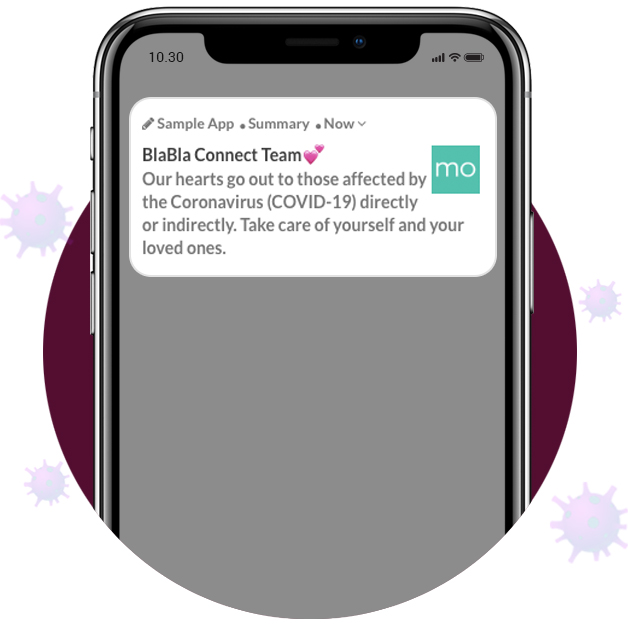
In fact, BlaBla Connect and its product PassTo have also waived off extra charges on its services and removed all types of transfer fees to help save this money for more important situations. Although their campaigns are meant to increase awareness, they have seen an increase in clicks on their COVID-19 push notifications.
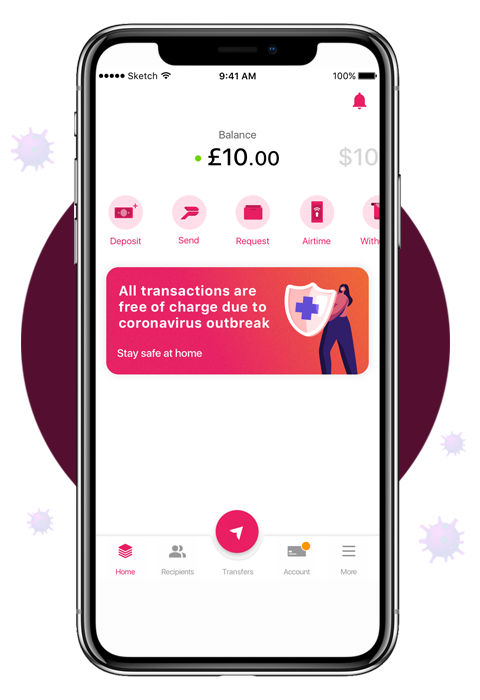
6
Businesses respond to COVID-19
[Video Series]
Update 9 (May 5th, 2020, 10:00 AM UTC): Why and how should businesses innovate during the COVID-19 crisis
We all understand that this is the time to innovate. But how do we do it? Businesses are looking for a playbook and want to avoid taking chances as the days go by.
To ease this process, to understand what is happening and to apply our experience to craft this, MoEngage’s Head of Growth, US, Vassil had an insightful video chat with Elizabeth Shaw, a CMO advisor and a former analyst with Gartner and Forrester. They discuss strategies that brands need to employ in the current times of COVID -19 and how they can rise above the panic:
Update 8 (April 14th, 2020, 9:00 AM UTC): Tips for marketers from the Travel & Hospitality and the E-commerce industry
Pulkit and Hastu recently looked at data to understand how COVID-19 has impacted the Travel & Hospitality and the E-commerce industry. While analyzing this data, they listed down a few tips for marketers:
- Travel app marketers need to understand that this is a temporary decline in active users and downloads. This time can be used to increase the number of reviews on your app store listings – good reviews have a direct impact on app visibility and ASO (app store optimization).
- E-commerce app marketers also need to remember that the surge in users is temporary, and they have to make the most out of this opportunity by practising the basics of mobile app retention.
Watch the entire conversation here:
Update 7 (April 13th, 2020, 9:00 AM UTC): The reason why only customer-centric and user-obsessed brands will thrive
‘Amid the COVID-19 pandemic, with organizations cutting down on marketing spends, retention and customer engagement have become more important than ever. It is time to start building a customer-obsessed culture’, says Raviteja Dodda, the CEO and co-founder of MoEngage.
Find out more insights as Ravi discusses the impact of COVID-19 on business verticals and his suggestions to ensure business continuity in these trying times:
Update 6 (April 8th, 2020, 9:00 AM UTC): How the payment ecosystem is impacted by COVID-19
After noticing a fall in revenue post the lockdown imposed in India, Instamojo is now seeing a steady climb in numbers on a daily basis.
This is what Sampad has to say – ‘For a company like Instamojo which helps businesses go online, we are here to stay for a long time. Especially small business owners who earlier wouldn’t have opted to go online will now start using services like ours’.
Listen to Sampad as he talks about the impact of COVID-19 on the payment services ecosystem:
Update 5 (April 6th, 2020,9:00 AM UTC): Remote work is becoming the future of businesses
This is what Gaurav Singh, the founder & CEO of Verloop has to say about remote work: “it will be an essential part of businesses’ contingency plans. Business continuity will have a checkbox that is remote. In the midst of this, customer support teams will evolve a lot given they are now learning how remote work can be done effectively‘.
These are Gaurav’s thoughts on how remote work is going to impact different verticals:
Update 4 (April 2nd, 2020, 9:00 AM UTC): How can Saas businesses help their customers in this COVID-19 pandemic, a virtual tête-à-tête with Khadim, the co-founder and CEO of Whatfix
“Going proactively with a pitch to sell is not a good idea right now. There needs to be a lot more empathy. Service providers could help customers by providing additional licenses and access to tools”, says Khadim Batti, Co-founder & CEO, Whatfix.
Whatfix has seen an increase in demand for licenses from their existing customers. Since most teams at Whatfix work remotely, they were able to put processes in place quickly and be prepared. Whatfix is now educating its new customers about how they can make their workforce more productive in these times.
Update 3 (April 1st, 2020, 8:00 AM UTC): Ankur Warikoo, Co-founder of Nearby talks about the importance of content during these times
“Content is the best form of marketing investment you can make in times of crisis” is the advice Ankur Warikoo, the co-founder of Nearbuy gives to app marketers.
Ankur stresses that it is time to focus on customer care and operations in order to reach and comfort the customers. He suggests that being honest and owning up for the inconvenience caused in an authentic manner will go a long way.
Check out the 3 key aspects to marketing in times of crisis according to Ankur:
Update 2 (March 27th, 2020, 11:30 AM UTC): Karthik, the Managing Partner of Blume Ventures says being resilient is the way forward
‘Being frugal, being resilient, taking collective responsibility, and building a sustainable set of organizations is the only way the ecosystem can move forward with the ongoing crisis’, remarks Karthik B. Reddy, Managing Partner, Blume Ventures.
Discover the key learnings from the Venture Capital & Private Equity ecosystem during this global pandemic, in this video below:
Update 1 (March 26th, 2020, 12:00 PM UTC): Fitness Brand, GOQii’s preparedness and communication helps them launch products in times of crisis
Vishal Gondal, the founder & CEO of GOQii talks about how a preemptive work from home drill helped them launch new products amid the COVID-19 pandemic in the video below.
His golden tip to business? “Over-communicate, don’t under-communicate”. Watch the video below to get the entire excerpt.
Conclusion
We hope that this pandemic passes soon. Meanwhile, use this downtime to re-look at some of your strategies, analyze data, work on refining your user segmentation, and find ways to improve your campaign performance. Above all, stay safe and stay indoors as much as possible.
We’ll keep updating this article with more information in the coming weeks. Meanwhile bookmark this page to receive notifications about more such trends, marketing stories, and for the complete COVID-19 report.


